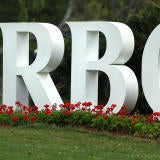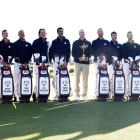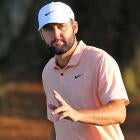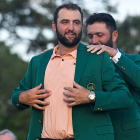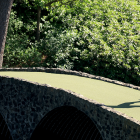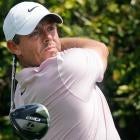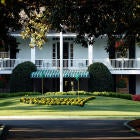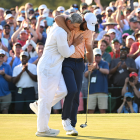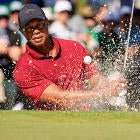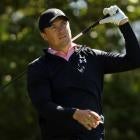The United States hasn't won consecutive Ryder Cups since it won three straight from 1989-93. This also marks the last time the U.S. won in Europe, which makes sense given that the Ryder Cup is played on the other side of the pond every other time it's contested.
So why the futility for the United States? Well, twice (1997 and 2010) they have lost one-point matches. Once (2002) they got beat when they shouldn't have. Once (2006) they got dusted when they should have. And once (2014) they had a messy team room led by captain Tom Watson that led to all kinds of issues.
In most cases, it hasn't been a matter of the U.S. choking off wins that turn into losses like some people may think. Europe has had some spectacular teams in this stretch, and the U.S. was still 1.5 total points from having won two more.
This year, the U.S. is loaded to the gills, and Europe is, well, not. The lowest-ranked player on the U.S. side is Phil Mickelson, who is ranked No. 25 (!) in the world. The U.S. used captain's picks on two of the 10 best players ever (Mickelson and Tiger Woods), winners of three of the four playoff events (Woods and Bryson DeChambeau) and three of the top six in the final FedEx Cup standings (Woods, DeChambeau and Tony Finau). Those were their captain's picks!
The U.S. Ryder Cup team has an average World Rank of 11.2, the best of any team (U.S. or Europe) since the World Ranking began in 1986.
— Justin Ray (@JustinRayGC) September 25, 2018
Genuinely believe we’re going to look back on this US Ryder Cup team the same way basketball fans remember the ‘92 Olympic team. Dream team. pic.twitter.com/rRrVjw0nF9
— LKD (@LukeKerrDineen) September 26, 2018
Still, it's tough to win away games, and not all of those U.S. losses in Europe were because the Euros had a better team. Things can go sideways quickly at Ryder Cups, and you have to have answers from both your players and your captain. The mess at Gleneagles in 2014 is a good example of the U.S. not having any answers when it didn't play out like they thought it would.
So what does the U.S. have to do to win in Europe this year? Here are three things I think will be paramount to them flying back with their first trophy since 1993.
1. Get hot early and often: In the last two Ryder Cups the U.S. has won, it has started the first session on Friday up 3-1 and 4-0, respectively. Both of those were stateside, and this is even more important in Europe. If you give guys like Alex Noren and Thorbjorn Olesen any foothold to think they belong with the Dustin Johnsons and Justin Thomases of the world, then you could be in a lot of trouble.
2. Expect the unexpected: Think back on 2014. Jordan Spieth and Patrick Reed went out and worked a Euro team that included Ian Poulter 5 and 4 in the morning session. They got benched for the afternoon. Why? Because Watson had already decided who the afternoon pairings were, even though it became clear in the morning that Spieth and Reed were 1) feeling it and 2) potentially the heart of the U.S. squad. I think the U.S. has been more open-minded to calling audibles since then, but it will be important for them to adjust on the fly within the predetermined boundaries they've set for themselves.
3. Stay in your lane: You know what happens when you try and get cute and pair Tiger Woods and Phil Mickelson together even though everyone (including them) knows it's a bad idea? You get thumped. This is more of the legwork that's done ahead of time -- players knowing who they could potentially play with and knowing roughly how many matches they'll play. The boundaries I mentioned above. It's an infrastructure issue that the U.S. seems to have more or less figured out. They need not worry about how Europe responds. Just play your guys where they feel most comfortable (specifically in singles) and come back with the trophy.
The other part of this is that the U.S. needs to (Aaron Rodgers voice) relax. If they go to Paris and play the way they're supposed to play, they'll win comfortably. It won't always feel like they're going to win comfortably, but they will. They're that much better. But if they let the swaying crowd and chanting Rory get in their heads a little bit, it could get going poorly. I trust that the U.S. has set this entire thing up (not just 2018 but beyond that, too) for sustained success. They know their players, know the right pairings and understand the proper audibles.
"We have a quality team," Mickelson said. "We have great leadership and opportunity to succeed, but we still have to perform and we still have to go out and play some great golf to achieve that. But if we were to do that, it would be something that I would remember and cherish for the rest of my life."
This is Mickelson's 12th Ryder Cup, and he's never won one in Europe. He has been at the heart of so many of the issues I talked about above, for better or worse. A win this weekend would do nothing for his already-secure legacy, but it would add to a resume that's already ridiculous. He knows that, and he knows that everything is situated for the U.S.' first win in Europe in a quarter of a century. He was 23 years old and not on the team last time it happened.
"I am aware this is most likely the last one on European soil and my last opportunity to be part of a team that would be victorious here, and that would mean a lot to me personally," he said. "I think it would mean a lot to our team and to the United States Ryder Cup to have a victory on foreign soil. It's been 25 years.
"But it's a very difficult task. We've got a ... European Team that's extremely talented with some great young players and great experience and great leadership, and although I love our team and I love our players and I love our leadership, it's going to be a very difficult match for both sides."











